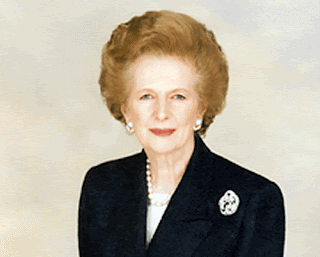THATCHERISM
 Thatcherism is the philosophy of the former British Prime Minister, Margaret Thatcher. It describes the conviction politics, economic and social policy, and political style of the British Conservative politician. Margaret Thatcher, who was leader of her party from 1975 to 1990. It has also been used by some [who?] to describe the beliefs of the British government while Thatcher was Prime Minister between May 1979 and November 1990, and beyond into the governments of John Major, Tony Blair, Gordon Brown and David Cameron.
Thatcherism is the philosophy of the former British Prime Minister, Margaret Thatcher. It describes the conviction politics, economic and social policy, and political style of the British Conservative politician. Margaret Thatcher, who was leader of her party from 1975 to 1990. It has also been used by some [who?] to describe the beliefs of the British government while Thatcher was Prime Minister between May 1979 and November 1990, and beyond into the governments of John Major, Tony Blair, Gordon Brown and David Cameron.
British Prime Minister Margaret Thatcher
Thatcherism claims to promote low inflation, the small state and free markets through tight control of the money supply, privatisation and constraints on the labour movement. It is often compared with Reaganomics in the United States, Rogernomics in New Zealand and Economic Rationalism in Australia as a key part of the worldwide neoliberal movement. Nigel Lawson, Thatcher's Chancellor of the Exchequer from 1983 to 1989, listed the Thatcherite ideals as:
Free markets, financial discipline, firm control over public expenditure, tax cuts, nationalism, 'Victorian values' (of the Samuel Smiles self-help variety), privatisation and a dash of populism.
Thatcherism is thus often compared to classical liberalism. Milton Friedman claimed that "the thing that people do not recognise is that Margaret Thatcher is not in terms of belief a Tory. She is a nineteenth-century Liberal." Thatcher herself stated in 1983: "I would not mind betting that if Mr Gladstone were alive today he would apply to join the Conservative Party".In the 1996 Keith Joseph memorial lecture Mrs. Thatcher argued that "The kind of Conservatism which he and I...favoured would be best described as ‘liberal’, in the old-fashioned sense. And I mean the liberalism of Mr. Gladstone, not of the latter day collectivists" However, Thatcher once told Friedrich Hayek: "I know you want me to become a Whig; no, I am a Tory". Hayek believed "she has felt this very clearly".
But the relationship between Thatcherism and liberalism is complicated. Thatcher's former Defence Secretary John Nott claimed that "it is a complete misreading of her beliefs to depict her as a nineteenth-century Liberal". As Ellen Meiksins Wood has argued, Thatcherite capitalism was compatible with traditional British political institutions. As Prime Minister, Thatcher did not challenge ancient institutions such as the monarchy or the House of Lords, but some of the most recent additions: such as the trade unions. Indeed, many leading Thatcherites, including Thatcher herself, went on to join the House of Lords: an honour which Gladstone, for instance, had declined.
Thinkers closely associated with Thatcherism include Keith Joseph, Enoch Powell, Friedrich Hayek and Milton Friedman. In an interview with Simon Heffer in 1996 Thatcher stated that the two greatest influences on her as Conservative leader had been Joseph and Powell, who were both "very great men
Thatcherism before Thatcher
A number of commentators have traced the origins of Thatcherism in post-war British politics. The historian Ewen Green claimed there was resentment of the inflation, taxation and the constraints imposed by the labour movement, which was associated with the so-called Buttskellite consensus in the decades before Thatcher came to prominence. Although the Conservative leadership accommodated itself to the Attlee government's post-war reforms, there was continuous right-wing opposition in the lower ranks of the party, in right-wing pressure groups like the Middle Class Alliance and the People's League for the Defence of Freedom, and later in think tanks like the Centre for Policy Studies. For example, in 1945 the Conservative Party Chairman Ralph Assheton had wanted 12,000 abridged copies of The Road to Serfdom (a book by the anti-socialist economist Friedrich von Hayek later closely associated with Thatcherism), taking up one-and-a-half tons of the party's paper ration, distributed as election propaganda. The historian Dr. Christopher Cooper has also traced the formation of the Monetarist economics at the heart of Thatcherism back to the resignation of Conservative Chancellor of the Exchequer Peter Thorneycroft in 1958
Some commentators have argued that Thatcherism should not be considered properly libertarian. Noting the tendency towards strong central government in matters concerning the trade unions and local authorities, Andrew Gamble summarised Thatcherism as "the free economy and the strong state". Simon Jenkins accused the Thatcher government of carrying out a 'nationalisation' of Britain
Thatcherite economics
Thatcherism is associated with the economic theory of monetarism. In contrast to previous government policy, monetarism placed a priority on controlling inflation over controlling unemployment. According to monetarist theory, inflation is the result of there being too much money in the economy. It was claimed that the government should seek to control the money supply in order to control inflation. However, by 1979 it was not only the Thatcherites who were arguing for stricter control of inflation. The Labour Chancellor Denis Healey had already adopted some monetarist policies, such as reducing public spending and selling off the government's shares in BP.
Moreover, it has been argued that the Thatcherites were not strictly monetarist in practice. A common theme centres on the Medium Term Financial Strategy. The Strategy, issued in the 1980 Budget, consisted of targets for reducing the growth of the money supply in the following years. After overshooting many of these targets, the Thatcher government revised the targets upwards in 1982. Analysts have interpreted this as an admission of defeat in the battle to control the money supply. The economist C. F. Pratten claimed:
Since 1984, behind a veil of rhetoric, the government has lost any faith it had in technical monetarism. The money supply, as measured by £M3, has been allowed to grow erratically, while calculation of the PSBR is held down by the ruse of subtracting the proceeds of privatisation as well as taxes from government expenditure. The principles of monetarism have been abandoned.
Thatcherism is also associated with supply-side economics. Whereas Keynesian economics holds that the government should stimulate economic growth by increasing demand through increased credit and public spending, supply-side economists argue that the government should instead intervene only to create a free market by lowering taxes, privatizing state industries and increasing restraints on trade unionism.
According to the Wall Street Journal, "Margaret Thatcher and her minions urged the 'moaning minnies' of the North to 'get on your bike' to the more prosperous South
Dispute over the term
It is often claimed that the word "Thatcherism" was coined by cultural theorist Stuart Hall in a 1979 Marxism Today article, although the term had in fact been widely used before then. However, not all social critics have accepted the term as valid, with the High Tory journalist T. E. Utley believing that "There is no such thing as Thatcherism." Utley contended that the term was a creation of Mrs. Thatcher's enemies who wished to damage her by claiming that she had an inflexible devotion to a certain set of principles and also by some of her friends who, "for cultural and sometimes ethnic reasons" had little sympathy with what he described as the "English political tradition." Thatcher was not an ideologue, Utley argued, but a pragmatic politician; and he gave the examples of her refusal to radically reform the welfare state, and her avoidance of a miners' strike in 1981 at a time when the Government was not ready to handle it.
Some critics on the Left, such as Anthony Giddens, claim that Thatcherism was pure ideology, and that her policies marked a change which was dictated more by political interests than economic reasons:
Rather than by any specific logic of capitalism, the reversal was brought about by voluntary reductions in social expenditures, higher taxes on low incomes and the lowering of taxes on higher incomes. This is the reason why in Great Britain in the mid 1980s the members of the top decile possessed more than a half of all the wealth (Giddens 1993, 233). To justify this by means of economic "objectivities" would be an ideology. What is at play here are interests and power.
The Conservative historian of Peterhouse, Maurice Cowling, also questioned the uniqueness of "Thatcherism". Cowling claimed that Mrs. Thatcher used "radical variations on that patriotic conjunction of freedom, authority, inequality, individualism and average decency and respectability, which had been the Conservative Party's theme since at least 1886." Cowling further contended that the "Conservative Party under Mrs. Thatcher has used a radical rhetoric to give intellectual respectability to what the Conservative Party has always wanted
Criticism
Critics of Thatcherism claim that its successes were obtained only at the expense of great social costs to the British population. Industrial production fell sharply during Thatcher's government, which critics believe was the reason for increased unemployment during her early years as prime minister. There were nearly 3.3 million unemployed in Britain in 1984, compared to 1.5 million when she first came to power in 1979, though that figure had fallen to some 1.6 million by the end of 1989. When she resigned in 1990, 28% of the children in Great Britain were considered to be below the poverty line, a number that kept rising to reach a peak of 30% in 1994 during the Conservative government of John Major, who succeeded Thatcher. While credited with reviving Britain's economy, Mrs. Thatcher also was blamed for spurring a doubling in the poverty rate. Britain's childhood-poverty rate in 1997 was the highest in Europe. During her government Britain's Gini coefficient reflected this growing difference, going from 0.25 in 1979 to 0.34 in 1990
Culled from Wikipedia



Comments
Post a Comment